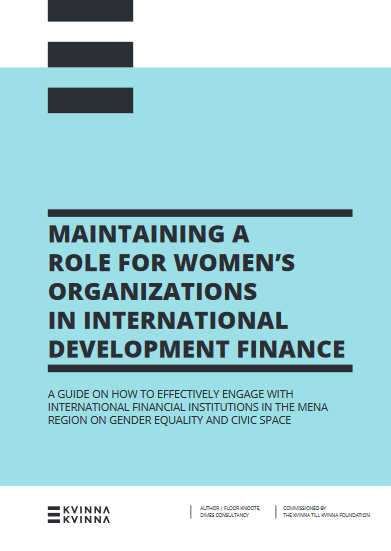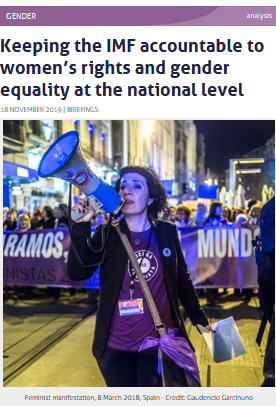 International financial institutions
International financial institutions  Exercises
Exercises
International financial institutions: National-level advocacy
Many of the mechanisms we have discussed until this point have been related to international conventions and mechanisms. It is however very possible to undertake advocacy efforts towards a more equal and just macroeconomic policy at the national level, without connecting the process to international mechanisms.1Of course, working on international-level advocacy without connecting it to the national-level advocacy (e.g. for standard-setting structures) is also possible. However, the cases where this can be a stronger approach are limited. While international mechanisms do give us important pressure points for accountability and change in macroeconomic policies, your country or your organisation’s current context may be more strongly influenced by national level advocacy.
Because every country’s economic and political decision-making mechanisms and institutions are different, there will never be a ‘one size fits all’ methodology for advocacy at the national level. We will try to give you some ideas about possible entry points for national-level advocacy on macroeconomics and gender equality.
As can be seen from the above quote, the restrictions for the general public to be a part of macroeconomic decision-making starts at the level of information gathering. Information about macroeconomic policies may not be made available to the general public. Even when they are accessible, they may be cloaked in data-heavy information and economic jargon. Advocating for the accessibility of information on macroeconomic policies can be one of the first entry points. This is of course crucial for democratic and transparent governance of the country.
 When a women’s rights organisation is new to the topic of macroeconomics and that area of work, it may prove helpful to connect with other feminist or rights-based groups that may have already established macroeconomic advocacy routes into the central or local governments. These may include trade unions, employer associations and labour organisations, and feminist economic and development justice groups, among others. Other approaches that can be taken include finding allies within these organisations, building their capacity on gender dimensions of macroeconomic policy, and taking their support towards opening up space in macroeconomic discussions for women’s rights organisations. Cross-movement solidarity can also increase the capacity for intersectional analysis among both the economic justice organisations and the women’s rights organisations.
When a women’s rights organisation is new to the topic of macroeconomics and that area of work, it may prove helpful to connect with other feminist or rights-based groups that may have already established macroeconomic advocacy routes into the central or local governments. These may include trade unions, employer associations and labour organisations, and feminist economic and development justice groups, among others. Other approaches that can be taken include finding allies within these organisations, building their capacity on gender dimensions of macroeconomic policy, and taking their support towards opening up space in macroeconomic discussions for women’s rights organisations. Cross-movement solidarity can also increase the capacity for intersectional analysis among both the economic justice organisations and the women’s rights organisations.
Another important avenue for influencing macroeconomic policy is through engagement with government officials and processes to be a part of decision making. The finance and budget officials, staff of the central bank, officials of ministries such as ministry of finance and treasury, are sometimes more accessible in the national context.2If these officials and staff are not accessible within the national context, the international processes (in which women’s rights organisations can directly participate) provide physical spaces where such access becomes possible. These connections can later be utilised in the national context for national-level activity. Once such a connection is established, these then become possible: raising concerns and suggestions for amendment of current policies, conveying of possible new policies, and implementation schemes that would ensure more gender equal and economically just policies.
 Women’s rights organisations (WROs) are among the closest groups in all countries to the realities on the ground. Macroeconomic policies have profound impacts on all the issues these organisations undertake. For these reasons and of course many more, WROs should be an integral part of macroeconomic decision-making. Their power to monitor, evaluate, and analyse the effects of macroeconomic policy on the society in general (and on women and girls in particular) is very valuable in making these effects visible to all citizens.
Women’s rights organisations (WROs) are among the closest groups in all countries to the realities on the ground. Macroeconomic policies have profound impacts on all the issues these organisations undertake. For these reasons and of course many more, WROs should be an integral part of macroeconomic decision-making. Their power to monitor, evaluate, and analyse the effects of macroeconomic policy on the society in general (and on women and girls in particular) is very valuable in making these effects visible to all citizens.
There must be greater awareness of the impacts of macroeconomic policies, principles, and projects, and also understanding of the broader economic contexts and its systemic connections within which decisions relating to women’s human rights occur. This awareness and understanding strengthens the movement and helps build solidarity across borders and civil society. This in turn can make macroeconomic policy more accessible (also in terms of language, data, and how it is presented). It also becomes more democratic, equal, and just.
If you’re interested in exploring engagement with IFIs and connecting national-level advocacy with global level accountability spaces relating to gender equality and macroeconomics, contact IWRAW Asia Pacific programme manager Constanza Pauchulo at constanza@iwraw-ap.org.
 International financial institutions
International financial institutions  Exercises
Exercises
Footnotes
- 1Of course, working on international-level advocacy without connecting it to the national-level advocacy (e.g. for standard-setting structures) is also possible. However, the cases where this can be a stronger approach are limited.
- 2If these officials and staff are not accessible within the national context, the international processes (in which women’s rights organisations can directly participate) provide physical spaces where such access becomes possible. These connections can later be utilised in the national context for national-level activity.

